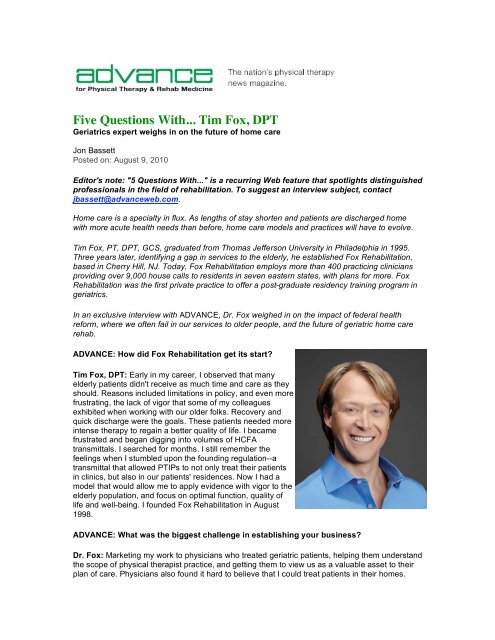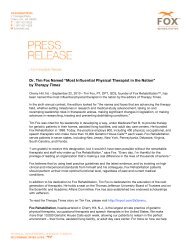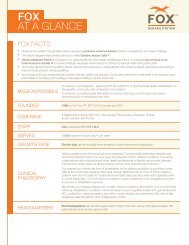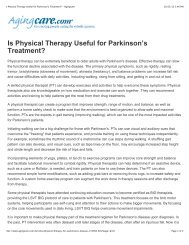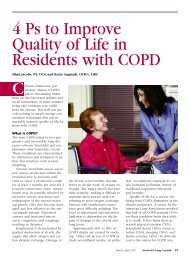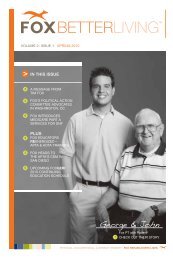Five Questions with...Tim Fox, DPT: Geriatrics ... - Fox Rehabilitation
Five Questions with...Tim Fox, DPT: Geriatrics ... - Fox Rehabilitation
Five Questions with...Tim Fox, DPT: Geriatrics ... - Fox Rehabilitation
Create successful ePaper yourself
Turn your PDF publications into a flip-book with our unique Google optimized e-Paper software.
<strong>Five</strong> <strong>Questions</strong> With... <strong>Tim</strong> <strong>Fox</strong>, <strong>DPT</strong><br />
<strong>Geriatrics</strong> expert weighs in on the future of home care<br />
Jon Bassett<br />
Posted on: August 9, 2010<br />
Editor's note: "5 <strong>Questions</strong> With..." is a recurring Web feature that spotlights distinguished<br />
professionals in the field of rehabilitation. To suggest an interview subject, contact<br />
jbassett@advanceweb.com.<br />
Home care is a specialty in flux. As lengths of stay shorten and patients are discharged home<br />
<strong>with</strong> more acute health needs than before, home care models and practices will have to evolve.<br />
<strong>Tim</strong> <strong>Fox</strong>, PT, <strong>DPT</strong>, GCS, graduated from Thomas Jefferson University in Philadelphia in 1995.<br />
Three years later, identifying a gap in services to the elderly, he established <strong>Fox</strong> <strong>Rehabilitation</strong>,<br />
based in Cherry Hill, NJ. Today, <strong>Fox</strong> <strong>Rehabilitation</strong> employs more than 400 practicing clinicians<br />
providing over 9,000 house calls to residents in seven eastern states, <strong>with</strong> plans for more. <strong>Fox</strong><br />
<strong>Rehabilitation</strong> was the first private practice to offer a post-graduate residency training program in<br />
geriatrics.<br />
In an exclusive interview <strong>with</strong> ADVANCE, Dr. <strong>Fox</strong> weighed in on the impact of federal health<br />
reform, where we often fail in our services to older people, and the future of geriatric home care<br />
rehab.<br />
ADVANCE: How did <strong>Fox</strong> <strong>Rehabilitation</strong> get its start<br />
<strong>Tim</strong> <strong>Fox</strong>, <strong>DPT</strong>: Early in my career, I observed that many<br />
elderly patients didn't receive as much time and care as they<br />
should. Reasons included limitations in policy, and even more<br />
frustrating, the lack of vigor that some of my colleagues<br />
exhibited when working <strong>with</strong> our older folks. Recovery and<br />
quick discharge were the goals. These patients needed more<br />
intense therapy to regain a better quality of life. I became<br />
frustrated and began digging into volumes of HCFA<br />
transmittals. I searched for months. I still remember the<br />
feelings when I stumbled upon the founding regulation--a<br />
transmittal that allowed PTIPs to not only treat their patients<br />
in clinics, but also in our patients' residences. Now I had a<br />
model that would allow me to apply evidence <strong>with</strong> vigor to the<br />
elderly population, and focus on optimal function, quality of<br />
life and well-being. I founded <strong>Fox</strong> <strong>Rehabilitation</strong> in August<br />
1998.<br />
ADVANCE: What was the biggest challenge in establishing your business<br />
Dr. <strong>Fox</strong>: Marketing my work to physicians who treated geriatric patients, helping them understand<br />
the scope of physical therapist practice, and getting them to view us as a valuable asset to their<br />
plan of care. Physicians also found it hard to believe that I could treat patients in their homes.
Many were skeptical because this was a new concept back then (some still are skeptical today). I<br />
had to build trust by taking good care of their patients and delivering what I promised. Another<br />
major barrier was starting a business <strong>with</strong> limited working capital. It was a major test, for both<br />
myself and my wife. Hard work always pays off.<br />
ADVANCE: What do you feel is missing from home care and geriatric rehabilitation today<br />
Dr. <strong>Fox</strong>: Most home care clinicians generally agree that many of their clients would benefit from<br />
ongoing skilled physical therapy once the HHA episode is complete, and they no longer qualify for<br />
agency care. The Medicare Part B outpatient clinic was originally intended to be that next step.<br />
But in practice we find that our elderly clients aren't able to access the community to gain these<br />
services. And if they can, they're typically unable to develop the consistency needed for physical<br />
therapists to "dose" them <strong>with</strong> the frequency, duration and intensity required to obtain the desired<br />
physiological outcome. What I feel is missing is a harmonious relationship between the home<br />
health agencies and community Part B house call providers. There are misunderstandings as to<br />
where we fit in the continuum, and what it is we do. A smooth, well-communicated transition to<br />
the next level of care can only enhance the physical foundation that the agency clinicians have<br />
begun to lay down.<br />
ADVANCE: What challenges do you see on the home care horizon<br />
Dr. <strong>Fox</strong>: We'll continue to be nimble and innovative--to work <strong>with</strong>in the given guidelines and<br />
policies to provide the most optimal care, while recognizing and compensating our clinicians for<br />
the exceptional work they do. Along <strong>with</strong> being clinically proactive, we'll continue to be proactive<br />
<strong>with</strong>in our business operations, divisions and political affairs. In regard to payment restrictions, it's<br />
difficult to comprehend how on one hand, CMS is (thankfully) beginning to discuss prevention,<br />
and the Obama Administration is pushing mandatory use of expensive EHRs, injecting over 30<br />
million people into the health care system, and accommodating an exponentially growing elderly<br />
population. On the other hand, at the same time the administration is recommending 39 percent<br />
cuts in payments to physical therapists in 2011. Go figure. I am indeed an optimist, but if the<br />
recent January-to-June mishap <strong>with</strong> the SGR debate <strong>with</strong>in the Physician Fee Schedule and the<br />
new proposed 2011 payment structure is any indication of the future, we're in for an interesting<br />
next couple of years. Intelligent decision making, strong application of foresight, and innovation<br />
<strong>with</strong> minimal bureaucracy will allow us to continue to flourish.<br />
ADVANCE: What's next for <strong>Fox</strong> <strong>Rehabilitation</strong><br />
Dr. <strong>Fox</strong>: We'll continue to build our clinical, business, and marketing operations infrastructure<br />
<strong>with</strong> a particular focus on clinical excellence. We have an amazing internal ladder of clinical<br />
excellence <strong>with</strong>in our Division of Professional Enhancement, which is due to roll out in<br />
September. It's a beefed-up version of our current programming. The graded ladder rewards and<br />
recognizes advancements and excellence in post-professional training, publications,<br />
presentations and scholarly works. I am very, very excited for our staff and our practice.<br />
For more information visit www.foxrehab.org<br />
Jon Bassett is managing editor at ADVANCE.<br />
© 2009 Merion Publications | 2900 Horizon Drive, King of Prussia, PA 19406 | 800-355-5627 | Publishers of ADVANCE<br />
Newsmagazines<br />
Read this article online at: http://physical-therapy.advanceweb.com/Features/Articles/<strong>Five</strong>-<br />
<strong>Questions</strong>-With-<strong>Tim</strong>-<strong>Fox</strong>-<strong>DPT</strong>.aspx


